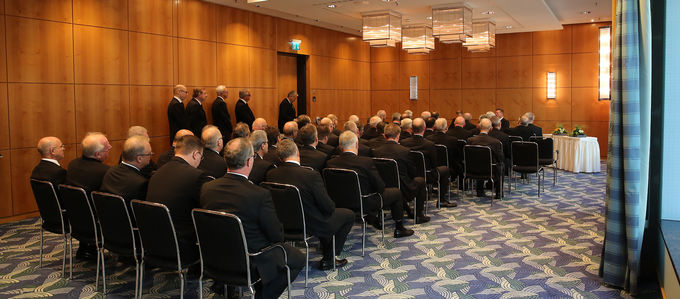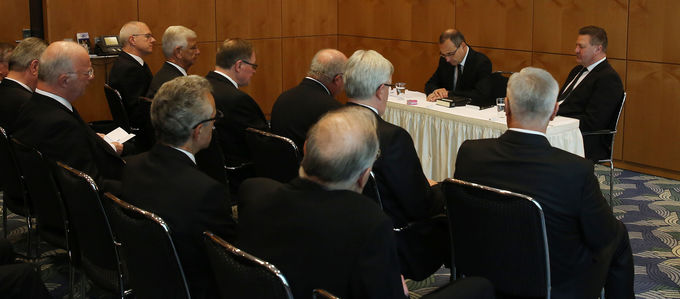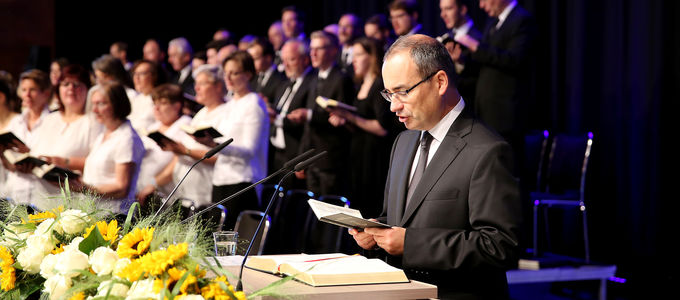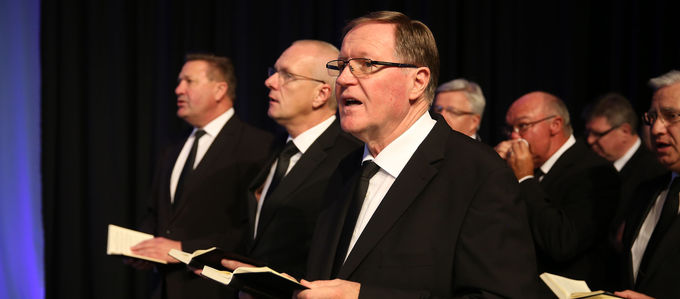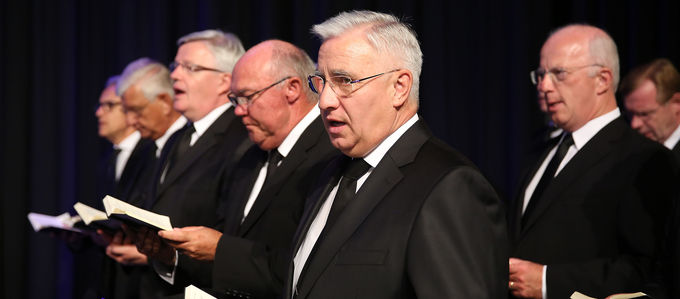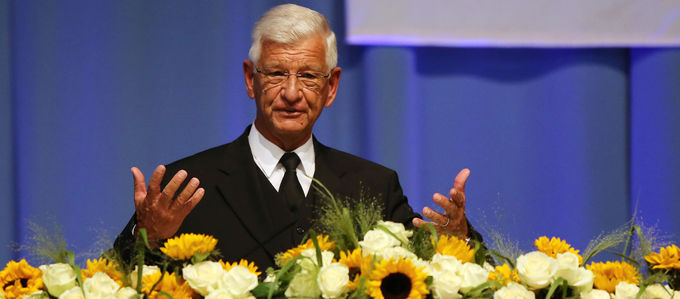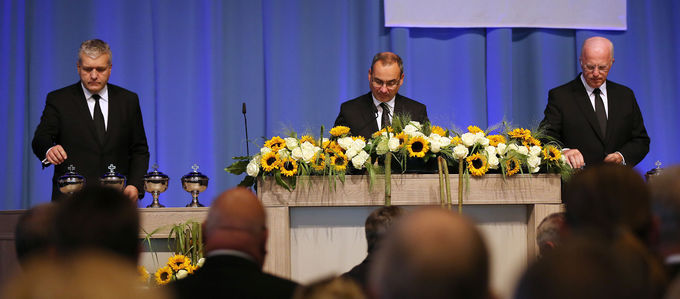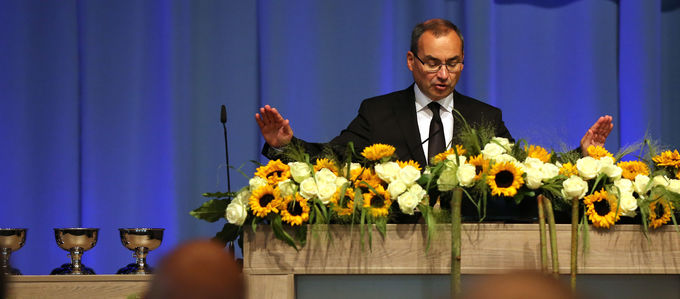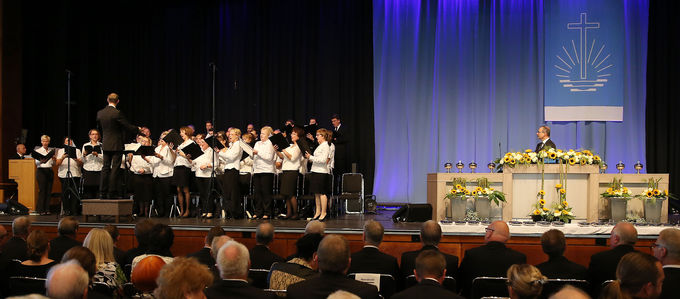Encouraging and imparting values
“Serve the Lord with gladness.” This is nothing new. What is new, however, is a whole catalogue of requirements and practical help given by the Chief Apostle. Following are excerpts from the recent divine service that he held for the ministers in Europe.
Some 8,800 brothers and sisters were in Düsseldorf (Germany) or connected by video transmission for this divine service held by Chief Apostle Jean-Luc Schneider on 27 September 2015. The divine service was based on the well-known psalm, “Serve the Lord with gladness” (Psalm 100: 2). The Chief Apostle celebrated the service in German. The sermon was translated into numerous European languages.
Workers, not dignitaries
“As ministers we are servants of God,” the Chief Apostle said. “Serving means work. We are not dignitaries but workers.” And what does this work consist of? “We have to make salvation accessible,” he said, and listed some of the tasks connected with this: celebrating divine services, doing our pastoral duties, and—for some—taking on leading responsibilities. “This kind of work we can only do with the power of the Holy Spirit. That means that we have to continually sanctify ourselves, and that requires a great deal of praying.”
“A minister can only do his work if he has a connection with the Apostle ministry,” the Chief Apostle said, making clear how important unity is in the Church. “This has nothing to do with our personal relationship to the Apostle. Ministers can only do their work if they are committed to and profess the creed, the Ten Articles of Faith. That is the connection to the Apostle ministry.”
Certainty creates joy
“How can I take joy out of my task?” was another central question the Chief Apostle raised. The answer followed with reference to a statement by Jesus, “Rejoice because your names are written in heaven” (Luke 10: 17–20). “That is a keyword for our time and for our ministration,” the Chief Apostle said. “We have reason to rejoice about our own salvation, because Jesus Christ has given it to us. And this joy is the driving force that motivates us to serve.”
“I call on all of us to be humble. We are human and cannot understand God,” the Chief Apostle said. “Just think of the Lord Jesus on the cross.” From a human perspective this was a defeat beyond compare, he said. “Jesus had been abandoned by everyone, hung on the cross, and was dying, and then He said, ‘It is finished! It is perfect. Everything is good.’ This shows that man is not able to measure divine achievements.”
“We are not turning a blind eye to what is going on in the congregations,” the Chief Apostle said, referring to the situation in our time. “We are aware of the decline here and there. That hurts me too, as a matter of fact, very much. But we have to remain humble and tell ourselves that we are not able to understand God. There is only one thing we can do and that is to trust God.”
Authority to impart salvation
“As ministers we are there to serve the congregation. We are there to help the brothers and sisters attain salvation. At our ordination we received authority to do that,” the Chief Apostle said and continued, “At the time of my ordination as Chief Apostle I was not vested with the power and authority to build a church or lead a choir. That would be a disaster! The power and authority vested in me helps me only when it comes to imparting salvation. Concerning everything else we have to work with our human skills, our human knowledge and know-how.”
“How are we supposed to impart salvation?” he asked and supplied the answer. People nowadays could be very happy on earth without God. But today, more than ever before, society needs a system of values. This also has an effect on the work of the ministers. Instead of guidelines and recommendations people need to be shown what is good. “My wish is that we pass out fewer guidelines and policies and instead impart and encourage values. The good is Jesus Christ. That is what we have to impart to the people. We have to put the focus on Jesus Christ more and more.”
Certainty creates joy
“How can I take joy out of my task?” was another central question the Chief Apostle raised. The answer followed with reference to a statement by Jesus, “Rejoice because your names are written in heaven” (Luke 10: 17–20). “That is a keyword for our time and for our ministration,” the Chief Apostle said. “We have reason to rejoice about our own salvation, because Jesus Christ has given it to us. And this joy is the driving force that motivates us to serve.”
Something else … “There is another kind of joy that the Lord Jesus referred to on several occasions: the joy in heaven over one sinner who repents. There are still many more brothers and sisters throughout the world besides us who are faithful. I am going to take this thought even further. There are many Christians the world over who are faithful, who believe in Jesus Christ. May this also be a reason for us to rejoice, and may this help us so that we can continue to serve the Lord with gladness.”
Article info
Author:
Date:
Keywords:
Andreas Rother
05.10.2015
Europe,
Germany,
divine services for the departed,
Divine service








